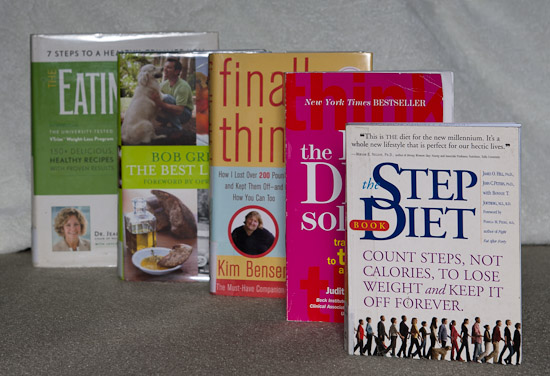
Many modern diet books, no matter what food plan they espouse, recommend a preparation phase of a few hours to a couple of weeks before implementation of a diet. Younger dieters may be impatient with the delay, but more mature seekers of a new regime can see the wisdom in establishing a firm foundation to build a steady lifestyle change. If one of your 2013 resolutions is to eat healthier or lose weight, take time to lay the groundwork for success.
Tips for how to prepare for a new way of eating are helpful whether you intend to follow a plan from a book, a commercial diet or a way of eating that you invent yourself. I pulled several books from the shelves to gather ideas on how to adjust mindset, modify behaviors and change the environment before counting your first calorie or forgoing your first dessert.

Know Yourself. Bob Greene, famous for being Oprah's personal trainer, recommended in "The Best Life Diet" to begin your diet plan by asking yourself three "tough questions":
1. Why are you overweight?
2. Why do you want to lose weight?
3. Why have you been unable to maintain weight loss in the past?
Written answers to these questions provide the support for individualized change based on the realities of your life.
Walk. "The Step Diet Book" by James O. Hill, et. al., advocated taking a week for preparation and then the next two weeks to "stop gaining weight." This was a revelation for me. I spent a couple of decades either losing or gaining but never considered such a simple concept as stop gaining. I was even more surprised by their suggestion for how to achieve that feat:
"We'll let you in on a big secret. It's not really that hard to stop weight gain. In fact, you can stop gaining weight by making one small change to your current lifestyle. Just walk 2,000 more steps (about one mile) each day. You can do it all at once or spread it out during the day."
Log everything. "The Eating Well Diet" by Jean Harvey-Berino devoted an early section of the book, before the diet, to keeping track of food, exercise, and daily or weekly weight.
"Start keeping a food diary today, and you're already on your way to losing weight. In fact, you might lose weight even if you make no other changes. How? Being more self-aware helps tip you off to behaviors (and calories) that contribute to weight gain, and helps you break bad habits. By writing something down, you become accountable for it, you have evidence of your behavior. That in itself is incredibly motivating for most people."
Choose Your Diet. If keeping a food diary doesn't generate the weight loss you desire, the next preparatory step may be to choose a diet. Most diet books, naturally, expect you to follow the diet in that book. I found two books, however, that encouraged the reader to research several diets, "Finally Thin!" by Kim Bensen and "The Beck Diet Solution" by Judith Beck. Bensen presented an A-Z guide of more than 25 different diets to choose from.
"If you are able to cut back on your portions and eliminate certain foods in a balanced way on your own to lose weight, that's wonderful. Most of us need a little more structure than that. If we didn't, we wouldn't be still struggling with our weight. That's where choosing a diet program comes in."
Beck took this one step further and recommended picking not one, but two reasonable diets:
"Why pick a second diet now? If you become discouraged with your first diet, you'll be at risk for abandoning your weight-loss efforts altogether. If you know from the start what your fallback diet will be, you'll be much more likely to switch to it and to continue dieting without interruption."
Change Your Environment. All five of the books I looked at recommended finding ways to alter your environment to make it easier to lose weight because the current conditions of our culture encourage overeating. As Harvey-Berino noted in "The Eating Well Diet":
"These days, if you want to eat right and live a healthy lifestyle, you wind up being part of the counterculture, opting out of the All-American ways of doing things."
One significant change that many diet books recommend is to make food temptations less accessible and visible while making healthy foods more available. Judith Beck made arranging your environment the topic of Day 7 in her 42-day plan in "The Beck Diet Solution":
"It's especially important to avoid environmental triggers when you're first starting your diet. 'Out of sight, out of mind' is a good policy right now. Although you won't necessarily have to reduce environmental triggers forever, you may decide, as I have, that you prefer to keep certain foods out of sight even after you've lost weight. Today, I'd like you to prepare your home and work environments by putting tempting foods where you won't easily see them -- and by putting wholesome foods allowed by your diet in plain view."
Incorporating these five activities into your life now will give your dieting efforts extra vitality in the new year, opening doors to greater success. With a fresh start built on solid principles, dieters over age 50 may not be the fastest weight losers, but our efforts will pay off in the long run with self-knowledge, patience and persistence. Here's wishing all of us a healthy and happy new year!
Join Joy Weese Moll on her personal blog for a New Year's Resolution Reading Challenge
For more New Year book interaction, follow @joyweesemoll on Twitter or the hashtag #NewYearBooks
Earlier on Huff/Post50:
